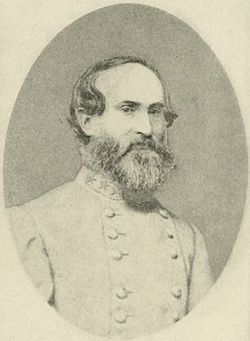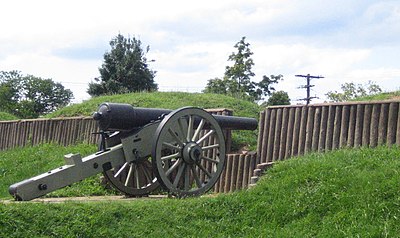In the summer of 1864, with Lee and Grant stalled in siege-like conditions around Petersburg and Richmond, both sides turned some of their focus to nearby areas. A Union army under David Hunter advanced up the Shenandoah Valley, and Robert E. Lee responded by sending Jubal Early to face him with the army's Second Corps. He disposed of Hunter at the Battle of Lynchburg, and then turned his attention to an invasion of the north. Although his small force could not be reasonably expected to make serious progress north, it was hoped that pressure on the northern home front would at least ease the pressure on Lee at Petersburg.
 |
| Early |
Thus Early turned his men north. Bypassing Harper's Ferry, they crossed the Potomac River into Maryland on July 5th. When Hunter had moved through the Shenandoah Valley, his men had destroyed much property owned by Confederate civilians. Now the Confederates would deliver some payback, though in a more upstanding fashion. Instead of burning Union homes, Early sent demands for money and supplies to the town magistrates. Collecting from them what he could, the Confederates moved east toward Washington.
The Federals were racing to gather what forces they could to throw in front of the advancing Confederate raiders. A corps was detached from Grant and sent hurriedly north to defend the capital. The commander of the Union's Middle Atlantic Department was Major General Lew Wallace, who later wrote Ben Hur. He rounded up all the men he could to Monocacy, where he could block Early from moving on Baltimore or Washington.
 |
| Monocacy |
When Early approached Monocacy on July 9th, 150 years ago today, he had 10,000 veterans to Wallace's 6,000 green troops. While Rodes division skirmished with the Federal force, Early sent cavalry later followed by Gordon's division, to cross the river to the north and strike the Union left. The plan eventually worked, and under heavy pressure from the Confederates and with his retreat threatened, Wallace ordered his men to fall back. He had lost just under 1,300 men. Less than 1000 Confederates were killed and wounded.
Although the Yankees lost the battlefield, the time Wallace and his men won was very valuable. As Grant later wrote:
If Early had been but one day earlier, he might have entered the capital before the arrival of the reinforcements I had sent .... General Wallace contributed on this occasion by the defeat of the troops under him, a greater benefit to the cause than often falls to the lot of a commander of an equal force to render by means of a victory.
If Early had been at the gates of Washington on that day, he may have been able to walk right in. As it was, he did not arrive before the city for two more days. After letting his men rest for the night, he determined not to attack the capital's formidable defenses, which by now were occupied by substantial numbers of northern troops. The Confederates probed the Union fortifications, which were for a short while held under the eye of Abraham Lincoln himself. Finding no opportunity to attack, Jubal Early set his men marching back to Virginia on July 13th. This was the last Confederate invasion of the north, and probably their best opportunity to capture Washington. Even if they had captured the northern capital, they probably could not have held it for long, and it is unlikely that it may not have had the same political consequences as earlier in the war. Nonetheless, as Early told a staff officer as they rode south, “Major, we haven't taken Washington, but we've scared Abe Lincoln like hell!”
 |
| Fort Stevens today |






0 comments:
Post a Comment